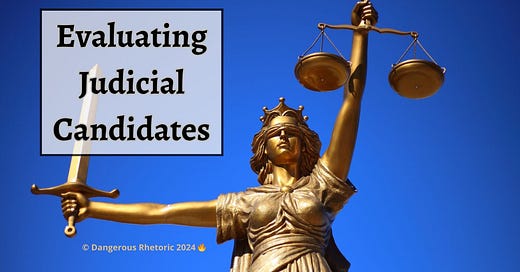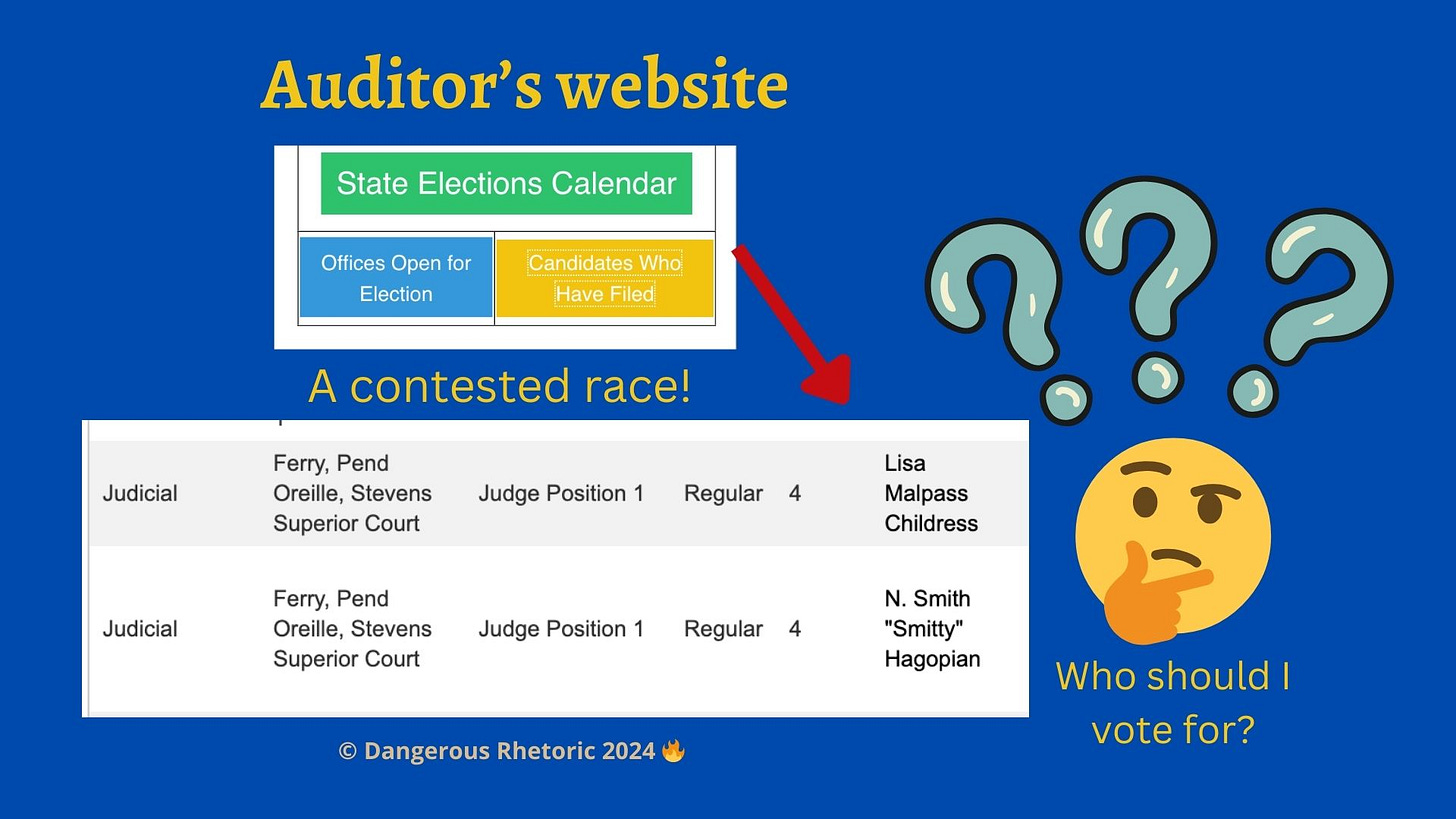In Washington state, judicial races are nonpartisan. The argument supporting a nonpartisan designation is that judges should be unbiased and neutral in their interpretation of the law. I think that’s a nice fantasy, but in reality, everyone has a bias, including judges. If judicial bias didn’t exist, appointments to the U.S. Supreme court would not be so contentious. We all know that judges have a bias, and we know that often the bias is either strongly conservative or strongly liberal.
At the Supreme Court level, justices generally have served on lower courts for many years, and there are years of written legal opinions to help the public determine if a justice has a conservative or liberal bias. Even then, it’s impossible to predict the future based on past opinions, but at least it’s a starting point in the process of evaluation. Unfortunately, in local county races, there’s no such shortcut, as the people running for district or superior court judge positions are often new to the bench.
In this circumstance, a nonpartisan designation creates a substantial handicap for the voters. How is the voter supposed to choose between two judge candidates with no prior record on the bench? If there is a prior record for a sitting judge, how does the average voter unearth it and understand it? In addition, Washington has a code of judicial conduct which applies to judicial candidates. This code restricts candidates from expressing opinions about matters or topics that may come before the court.
How does the voter learn more?
This year, I’ve made an attempt to develop some questions that voters can ask judicial candidates that would help us determine their implicit bias. These questions require that the voter do two things. First, you have to make an effort to research these questions yourself, and determine what answers to these questions would best fit your political point of view. Next, you’re going to have to call each candidate and conduct a short interview either in person or on the phone. Once you have answers from each candidate, you can share your findings with your friends and support your favorite candidates.
Interview Questions for Judicial Candidates
Icebreaker questions: These are personal background questions. Where did the candidate grow up? How long have they lived in the area? If they’ve moved into the area, where are they from originally and why did they move here? Are they married, divorced, have children, grandchildren, etc. Since this is a personal interview, you can share some of your background and start building a relationship. The goal is an honest and respectful dialogue with the candidate.
Education questions: Where did the candidate get their undergraduate degree and their law degree? Take notes so you can research the schools later. When and where did they pass the bar exam? Did they work their way through school? If so what did they do? Do they have student loans and have the loans been paid off? What type of law was their favorite during law school? What did they find appealing about that type of law?
Employment history: Where has the candidate practiced law and for how long? How long did they work at each place of employment? Are they in a law firm, or do they run their own practice? What type of law have they practiced, have they gotten the opportunity to practice their favorite type of law? Have they worked as a prosecuting attorney or as a defending attorney or both? If both, which side of the courtroom do they prefer and why?
Why run for office questions: Why did the candidate decide to run for this position? Can they explain what types of cases they will be hearing if they win the seat? A strong candidate can explain exactly what types of cases are brought to that particular court, either District Court, Superior Court or even the state Supreme Court.
Legal Foundations: What is your preferred school of constitutional interpretation? This question requires the voter to make an effort to learn a bit about the practice of law. Voters can learn more about constitutional interpretation at this legal research site. As a voter, what do you think is the most appropriate method of interpreting the U.S. Constitution? This will help you decide if the candidate fits your criteria.
Qualifications needed to practice law: The Washinbgton Supreme Court recently approved an alternative pathway to licensure. What does the candidate think about that? Should new lawyers need to pass the bar exam or not? What do you think about this? Does the candidate agree with you, and if not can they justify their opinion?
The Supreme Court questions: Who is the candidate’s favorite Supreme Court Justice and why? Which supreme court justice current or past does the candidate admire the most, and why?
The boundaries between branches: What does the candidate think about politicians who don’t respect Court rulings? An example is President Biden ignoring the Supreme Court’s ruling on student loan relief. Alternatively, what does the candidate think about courts that don’t respect lawmakers? An example of this is the Washington Supreme Court’s McCleary Decision, where the court mandated a level of funding for the schools, which was a controversial overreach into the business of the legislature.
Research now, vote confidently later
As you can see, researching your judicial candidates will require that you learn a bit about the law as well as making time to conduct interviews with the candidates.
I’ve used these questions to interview some judicial candidates in Ferry County, and I felt that these questions provided me with enough background information to make an informed decision in the race. Please let me know if you find these questions useful. I’d love to get your feedback on the questions and the interviews that you conduct.
Nancy Churchill is a writer and educator in rural eastern Washington State, and the state committeewoman for the Ferry County Republican Party. She may be reached at DangerousRhetoric@pm.me. The opinions expressed in Dangerous Rhetoric are her own. Dangerous Rhetoric is available on thinkspot, Rumble and Substack.
To get Dangerous Rhetoric in your inbox…
Sources:
1) Constitutional Interpretation, Heinonline blog, https://bit.ly/3xmp9yu
2) Supreme Court Approves Alternative Pathways to Lawyer Licensure in Washington State, https://bit.ly/3yWKlMb
3) Current Supreme Court Justices, https://bit.ly/4ehvfRn
4) History of the Supreme Court, https://bit.ly/3XhYFsH
5) Biden’s Student Loan Boast: The Supreme Court ‘Didn’t Stop Me’, WSJ, 2-23-24. https://on.wsj.com/3yRiaye
6) Following the money: How the Washington Supreme Court changed how the state funds education. https://bit.ly/4cbkKNM






Great questions. I know a Washington resident, Dean Isaacson, used to publish work he did researching judges running for office and how they ruled on different cases. I loved it and used it for determining who to vote for, but he moved to Idaho several years ago. Thanks for your input... I like those questions...
Timothy
Thank you so much. I have always struggled with just having to guess who to vote for when it comes to these sorts of candidates. Such wonderful advice.